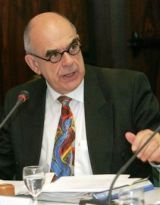UN’s Pronk – Darfur peacemakers must listen to Arab concerns
Nov 22, 2006 (CAIRO) — Darfur peacemakers must take into account legitimate concerns of the region’s Arab population, distinguishing regular Arabs from the “criminal janjaweed” militia responsible for atrocities, said Jan Pronk, the expelled head of the U.N. operation in Sudan.
 “We should take away some of the motives which inspire the janjaweed to attack,” Pronk said in an e-mail to The Associated Press in Cairo.
“We should take away some of the motives which inspire the janjaweed to attack,” Pronk said in an e-mail to The Associated Press in Cairo.
Separately, Pronk said he would be returning to his Khartoum office in early December to prepare the transition to his successor, who has yet to be appointed.
Sudan’s government told Pronk to leave Sudan in October, accusing him of exceeding his mandate. Pronk had published on his personal blog a report that government forces had suffered two defeats in Darfur and were deploying extra troops and militia in violation of Security Council resolutions.
U.N. Secretary-General Kofi Annan expressed full confidence in Pronk but withdrew him for consultations. Pronk had intended to step down on Dec. 31.
The three-year conflict in Darfur in western Sudan has become a battle between African rebels and government troops allied with the Arab militia, known as janjaweed. But it stems from a decades-old competition between African and Arab ethnic groups in Sudan for land, water and grazing rights.
More than 200,000 people have been killed and about 2.5 million people displaced in the fighting. U.N. investigators have blamed the janjaweed for the bulk of the rapes, arson, looting and killing.
But after world outcry over janjaweed atrocities, Darfur’s Arab minority feels more vulnerable, fearing it would lose out in any settlement. Some Arab nomads have recently voiced exasperation at the facilities in Darfur’s refugee camps, where aid groups provide drinking water and food to Africans who have had to flee their homes.
“Without the Arabs in Darfur, there is no political solution,” Pronk wrote Monday.
“If we could distinguish between, on the one hand, Arabs with legitimate concerns and demands and, on the other, (the) Arab criminal Janjaweed, we could further the political process,” he added.
Pronk said that during his two and a half years in Darfur he regularly met Arab leaders, particularly those in West Darfur, to discuss security arrangements for U.N. humanitarian workers and to hear Arab views on peace initiatives.
Those Arabs who resort to violence have various motives, he said. “Many attacks are only criminal. Many are genocidal, aiming to cleanse an area. Some are (a) form of retaliation against other tribes, or against looting of camels, or against tribes which are considered to support the rebels.”
Pronk said he also had tried to meet Musa Hilal, the reputed leader of the janjaweed in North Darfur.
“At a certain moment Musa Hilal wanted to see me. We arranged a meeting, but (Sudanese) National Security prevented him (from keeping) the appointment. Thereupon I took the initiative to meet him. However, he avoided me,” Pronk wrote in the email.
Hilal, a tribal chief, is believed to be living in government seclusion in Khartoum. In April the U.N. Security Council and the United States imposed financial sanctions on Hilal, accusing him of orchestrating atrocities in Darfur.
Sudan’s government has long denied any connection with the janjaweed. But U.N. officials who investigated the conflict reported in 2005 that the state had armed the militia. And militiamen such as Hilal have confirmed in past interviews that the janjaweed took its orders from the regular army.
The U.N. undersecretary-general for humanitarian affairs, Jan Egeland, accused Sudan’s government on Saturday of arming the janjaweed and said it was committing acts of “inexplicable terror” against civilians. The Sudanese Ministry of Humanitarian Affairs accused Egeland of lying.
(AP)
